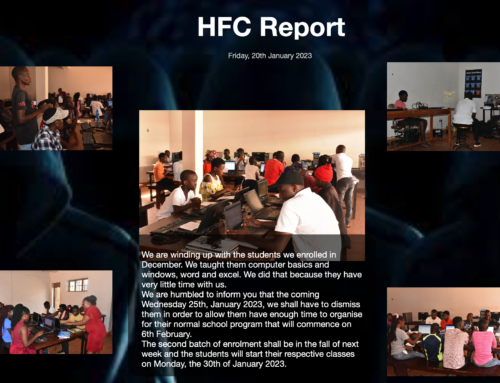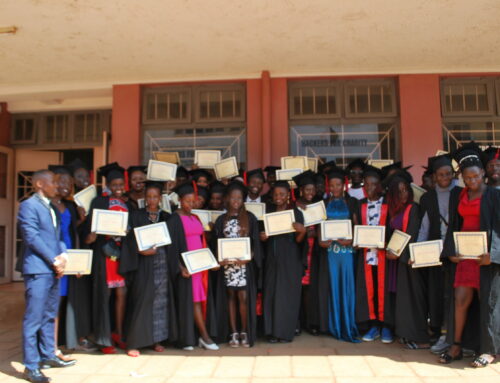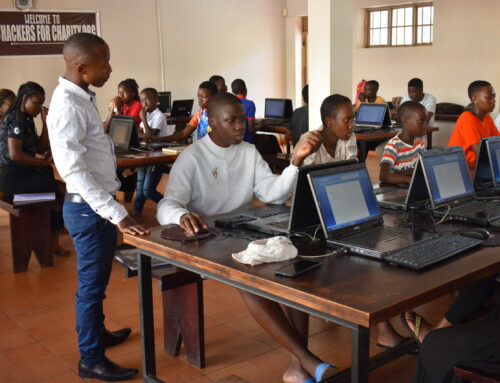We have some pretty wickedly cool things going on in Uganda right now, and I managed to capture the essence of it with photos.
The small dish on the left hand side is our UTL nano bridge for our Internet. The workers on the roof are installing a larger 90cm satellite dish, seen laying down in the last photo.
The contrast of this photo shocked me, even after living here for six years. Here we are putting another bit of high tech gear on the roof of our hackerspace overlooking an obliterated urban landscape where normal folks are just doing their best to get by.
As the installation continued, I watched our neighbors for a while. Kids played tag, dodging in and out of the buildings and around the clothes as the lady hung them. Chickens wandered around, and I could hear the bleating of an unseen goat. A tiny garden grew in the corner. A small charcoal cooking fire was burning, cooking what was likely beans in an old aluminum pot. Then I saw exactly what I was looking for: a young man sitting in the shadows in a blue shirt, using his smartphone.
I couldn’t help but smile. You see, this new piece of gear was more for our neighbors than it was for us.
We are installing a free-to-air satellite dish which I bought from a company that sells digital TV service. I had a hard time getting this equipment because I didn’t want a digital TV subscription. I only wanted the gear, and the company doesn’t make money on the gear. But I talked to the technician and he agreed to do it for a $20 “installation appreciation donation”.
After fifteen minutes, the technicians had the satellite frame installed, but I could tell they were already confused. They had never pointed a satellite east before.
I gave them the azimuth for “Inelsat 10”, deployed in 2001 from a Proton-K/DM3 rocket from site 81/23 of the Baikonur Cosmodrome located in the desert steppe of Kazakhstan.
When I told them this, they just blinked at me and made adjustments to the dish, as the analog needle on their “satellite finder” sat limp.
Clearly, they were not nearly as excited about this as I was. To the technicians, this was just another day on the job. Another installation of a decidedly luxury item for the upper and middle class. The only thing that made this mildly interesting for them was the fact that this was the only satellite pointing east in the entire town. But I knew something they didn’t: this was a totally new and super-nerdy project that would likely help their relatives in the village more than any middle or upper class Ugandan.
Eventually, after some fiddling the ancient detector’s needle started flapping around and the sickly piezo buzzer inside the unit came to life.
“There’s a satellite there,” they told me, visibly surprised. Now I had their attention.
I connected the receiver, connected my iPhone to its access point and loaded the page to fine-tune the satellite’s positioning. Then, something magic happened. We got a lock, and our bitrate started climbing, eventually reaching 4.58Mbit per second, much faster than anything I had seen in Uganda.
So what were we up to? We were using this equipment to talk to space (obviously, but worth mentioning because of the COOL FACTOR) and interface with a satellite that was broadcasting the Outernet library. From the Outernet website:
“Outernet takes the best of the web and broadcasts it from space for every human on Earth. The content we broadcast is determined by anyone who chooses to vote on the most important things to share with humanity.”
For years we have been working with RACHEL and world possible to bring some of the most valuable content on the planet to people that need it the most. The problem had always been the updates. When we deploy RACHEL on solar-powered devices and BRCKs and computers, folks can access content like Wikipedia and all sorts of books and health information from computers or even from their smartphones. But eventually, that content needs to be updated, and oh-by-the-way, wouldn’t it be nice if we could provide news updates and current information to RACHEL sites even if they don’t have an Internet connection?
Outernet solves this problem for us. Thanks to the Outernet group, we have received the first Alpha Outernet receiver in Uganda, and gotten it up and running with $50 of new (albeit repurposed) Digital TV satellite equipment.
What this means is that now, we can get all the great content from RACHEL in addition to alerts and news from around the world, and SO MUCH MORE for free, forever.
This is a huge leap forward in our efforts to leverage technology for folks that need it the most. In the next few weeks, I’ll be working to tweak Outernet to best serve the folks in Uganda, spreading our broadcast range so more folks can see and use it, and creating new deployment and integration strategies to make the most of what Outernet has to offer.
I’m so thankful for the donation, and can’t wait to dive in.

















